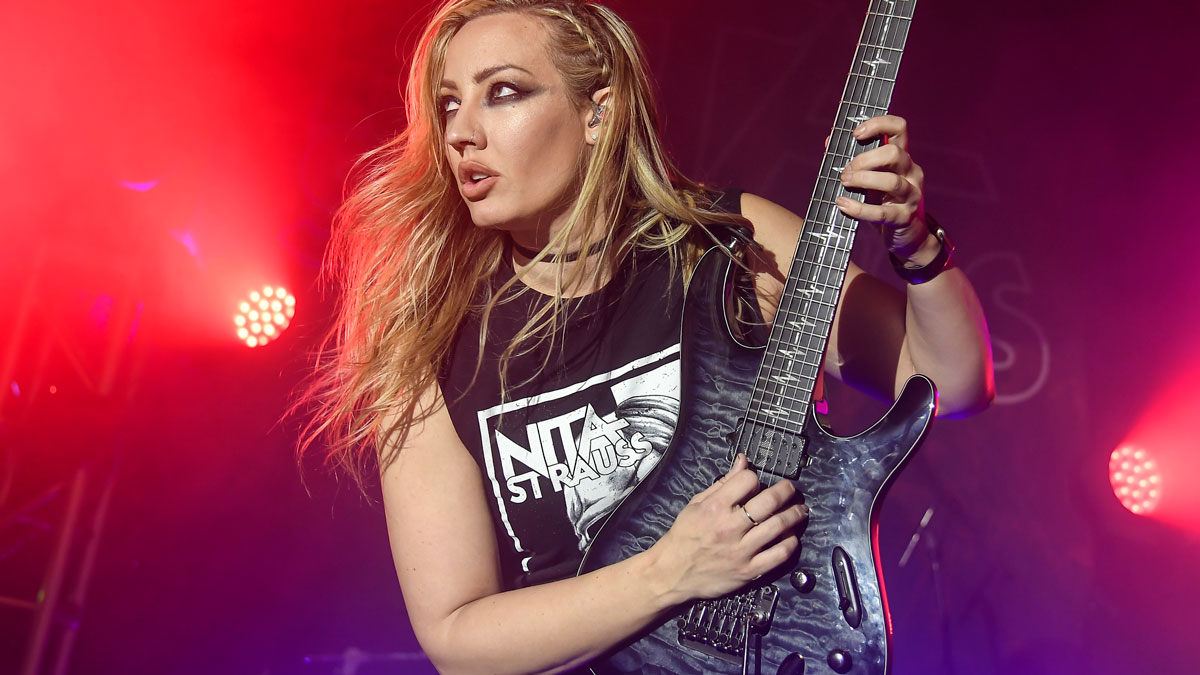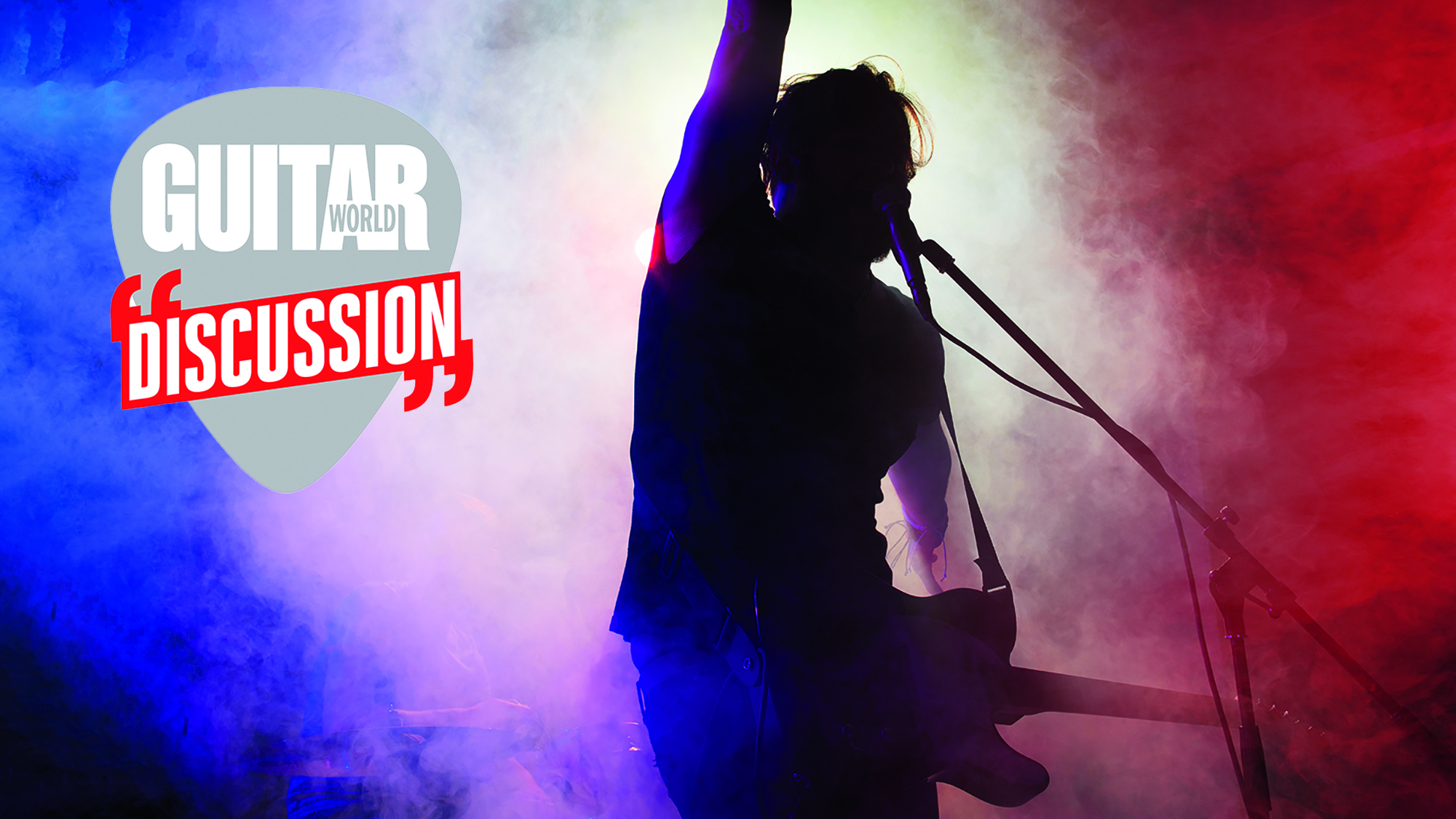Nita Strauss: "A guitar solo is a way for the guitarist to tell a chapter of the song's story. That dictates my approach, rather than, 'Here's a bunch of cool notes'"
The Ibanez signature shredder on reuniting with Alice Cooper for her latest single, how working with singers made her a less selfish musician, and why people got her departure from Cooper's band so wrong

There's been a ton of noise surrounding Nita Strauss of late, none of which has detered the Ibanez-wielding shredder.
Most of the chaos stemmed from Strauss stepping away from her longtime employ with Alice Cooper to hit the road with pop-turned-rock mega-star Demi Lovato. And while many of the metal faithful were perturbed, Strauss's most loyal fans understood her position as a gun for hire.
"There was no big moment where I threw my guitar in the air, stormed out, and quit," Strauss says. "It was more, 'Hey, I have this opportunity with Demi. She's working a lot this year, and Alice isn't. What do you think if I go and do this?' And Alice said, 'Go do it; I love it. Go off; have fun. We support you completely." Demi was working a lot, and Alice wasn't. I go where the work is."
With Lovato's hectic schedule dying down, Strauss has returned to Alice Cooper with the intent of pulling double duty. Indeed, for Strauss, a career in guitar-driven music isn't about playing it safe; it's exploratory, refreshing, and, most importantly, increasingly interesting.
"I definitely plan on doing Demi and Alice," Strauss reveals. "I've always been a hired gun. You have to be willing to be versatile, take risks, and try different things instead of staying in the same place, even if it's a safe place."
As she prepares for a busy year, Nita Strauss dialed in with Guitar World to discuss her latest single and return to Alice Cooper's band, her continued work with Demi Lovato, and the importance of staying true to her artistic vision.
What can you tell me about your latest single, Winner Takes All?
Get The Pick Newsletter
All the latest guitar news, interviews, lessons, reviews, deals and more, direct to your inbox!
"As I was putting the record together, I thought it would be cool to have Alice on a song but make it a modern rock track rather than the stuff you're used to hearing from him. Initially, our goal was to take Alice's voice that we know and love but showcase his vibe on this modern shred track. I think we hit it hard and nailed it."
Do you approach working with other singers differently than you do with Alice?
"I've been working with him for many years, so I understand what he likes and doesn't like to sing over. Having probably played on over 50 Alice Cooper songs at this point, I think we've got it dialed in. Besides that, collaborating with so many different singers has been incredible. But I never imagined myself as the type of musician with songs like this; I used to think of myself as a solo guitarist who would only stay in that world. So, to be able to do this has been a fascinating process."
While you might not have imagined yourself going down that road, you have. Has that opened you up or altered your approach at all?
"I think, as an instrumental guitar player, I was a selfish musician. I don't mean that in a bad way, but from a musical perspective, I was only thinking about myself. I wasn't thinking about what rhymes with what or what the song's key was for the singer to along with. And I was not thinking about radio or what works within a three-minute format to fit into a playlist, either.
"I was only writing for the sake of my art. But once I started working with different vocalists, I had to approach things from a more sensible standpoint of what makes sense for the song. I had to think about what might draw in the average listener who likes this type of music and what might open them up to new things."
Do you approach solos differently for instrumental versus vocal tracks?
Everything was planned for a long time before it was announced. So, reading things online where people said, 'Nita left Alice in the lurch and didn't give them time to find somebody new,' was completely inaccurate
"I think a guitar solo is a way for the guitarist to tell a little chapter of the story if that makes sense. But obviously, you're not using words; you're using your choices and emotions to contribute to the song's story. Even when I've done guest solos on other people's stuff, when I play live, I always try to get a sense of what the song is about. That dictates how I choose my notes and approach to serve the story, rather than, 'Here's a bunch of cool notes. Let me just play these and be done with it.'"
When you initially left Alice's band in 2022, did you know you'd be back, or were things more open-ended?
"It was very open-ended. There wasn't this big departure, which is how everything was construed by people that weren't there. I had a conversation with Alice and his manager, and what I put out on my social media was, 'I'm stepping away from the fall tour. I'm grateful for the opportunities I've had, and I'm not sure what will happen next.' Honestly, that was the entirety of what was going on."
Were you surprised by the mixed reaction you received?
"I was expecting a mixed reaction, but I definitely wasn't prepared for how strong of a reaction the news received. But the only thing that really got under my skin was how inaccurate a lot of the stuff people were saying was. I saw people saying, 'She walked out of the tour without giving Alice notice,' and none of that was true.
"Everything was in the works for months; everybody knew, Kane Roberts knew about it, and everything was planned for a long time before it was announced. So, reading things online where people said, 'Nita left Alice in the lurch and didn't give them time to find somebody new,' was completely inaccurate."
Was it challenging to adapt to Demi Lovato's style of music?
"I have to say… it wasn't all that different. If I had stepped into Demi Lovato's world in 2016, it would have been a very different show. But Demi's new record [Holy Fvck] is heavy rock. So, once I joined, we went out and did a heavy rock show with her every night. If they had been looking for a more traditional pop touring band, they wouldn't have had the band they did or had me be a part of it. I guess the big takeaway is that as a guitar player, I need to be versatile.
"I will say that one cool takeaway from the Demi tour was that she completely changed her style. If you listen to her old music, it sounds nothing like the music that got her to the level of stardom she has today. To me, that's the most rock 'n' roll thing you can do. And who knows? Maybe some of those girls will see Demi playing an Ibanez X series – a Chuck Schuldiner[-style] guitar – and they'll go out and learn to play, not because of me but because of her."
Speaking of Ibanez, have there been any new developments regarding your signature model?
"Honestly, we're playing catch-up at this point with my signature model. It's been in production for many years, and the newest model didn't come out too long ago. We're always excited to do new things, but I have paused it until we can get the orders that have come in shipped and out the door."
Have you made any exciting gear discoveries of late?
"I'm more of an 'if it's not broke, don't fix it' kind of player. As much as I love checking out and trying new things, I tend to stick with the same stuff I've used. But I will say that I've been getting myself into some new plugins on the recording side. I tried some Neural DSP stuff recently, and it blew me away. But I'm a fan of simplicity. I have never been a huge analog pedalboard type of person. Whatever is consistent, easy, and sounds great is what's good for me."
Are there any young guitarists you've been listening to recently?
"I'm absolutely obsessed with what Angel Vivaldi is doing right now. I did my first solo tour with him, and this new record [Away with Words: Part 2] he's putting out has a few singles that have blown my mind so far. His new stuff is more like fusion, while his original stuff is heavier.
"Aside from him, I have to give a shoutout to my Ibanez sisters, Yvette Young and Lari Basilio, who are absolutely crushing it. They're both putting out incredible music and touring. If Lari or Yvette are coming near you guys, see them. They're mind-blowing players."
In what ways have you grown over the last 12 months?
"I've gone through phases of listening to others about my work, but now I'm taking a step back and only doing what I think I should do. It's easy to get in that cycle… but it can take a lot out of you. Just look at Winner Takes All: there were two comments on Instagram right next to each other, and one was, 'Oh, this song is crap. You should do more songs like The Wolf You Feed. Do better, Nita.'
"And then, the comment right underneath said, 'Wow! I love this. This is exactly what you should be doing. I hated The Wolf You Feed.' So there will always be people with strong opinions, so taking a step back and being happy with where I'm at as a musician and a professional touring guitar player is a good step for me. It's much better than focusing on what other people think about my music. My decision and opinions are what matter most to me now."
- Winner Takes All (feat. Alice Cooper) is streaming now.
Andrew Daly is an iced-coffee-addicted, oddball Telecaster-playing, alfredo pasta-loving journalist from Long Island, NY, who, in addition to being a contributing writer for Guitar World, scribes for Bass Player, Guitar Player, Guitarist, and MusicRadar. Andrew has interviewed favorites like Ace Frehley, Johnny Marr, Vito Bratta, Bruce Kulick, Joe Perry, Brad Whitford, Tom Morello, Rich Robinson, and Paul Stanley, while his all-time favorite (rhythm player), Keith Richards, continues to elude him.
Ozzy Osbourne’s solo band has long been a proving ground for metal’s most outstanding players. From Randy Rhoads to Zakk Wylde, via Brad Gillis and Gus G, here are all the players – and nearly players – in the Osbourne saga
“I could be blazing on Instagram, and there'll still be comments like, ‘You'll never be Richie’”: The recent Bon Jovi documentary helped guitarist Phil X win over even more of the band's fans – but he still deals with some naysayers














